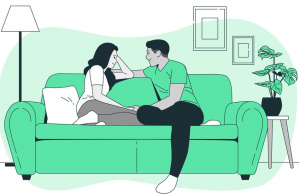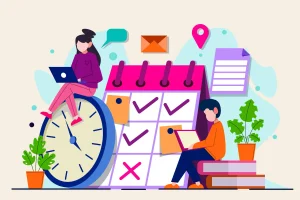Why Don’t More Couples Choose Marriage Counseling?
By Prapoorna M
Last Updated: August 12, 2024
Marriage Counseling is often seen as a last resort, a step couples take when they feel their relationship is on the brink of collapse. But in reality, marriage counseling is much more than that. It’s a proactive way to address issues, improve communication, and strengthen the bond between partners. Despite its many benefits, many couples still hesitate to take this step.
In today’s fast-paced world, marriages face increasing challenges. From balancing careers and family responsibilities to dealing with the stress of daily life, couples often find themselves struggling to maintain a healthy relationship. Misunderstandings, lack of communication, and unresolved conflicts can slowly erode the foundation of a marriage.
Understanding the Benefits of Marriage Counseling
Marriage counseling offers a wide range of benefits that can significantly improve the quality of a relationship. At its core, counseling provides couples with a safe space to communicate openly and honestly, which is often the first step in resolving long-standing issues.
1. Improved Communication:
Communication is the backbone of any healthy relationship, yet it’s one of the most common areas where couples struggle. Marriage counseling helps partners express their thoughts and feelings in a constructive manner, bridging the gap that often forms due to misunderstandings or unspoken frustrations. By learning how to communicate more effectively, couples can avoid conflicts and build a stronger connection.
Also Read: Better ways to communicate in relationships
2. Conflict Resolution:
Every couple faces conflicts, but how they handle these conflicts can make or break a relationship. Marriage counseling equips couples with the tools and techniques needed to resolve disputes in a healthy way. Instead of letting small disagreements escalate into major arguments, counseling teaches couples how to address issues calmly and find mutually beneficial solutions. This skill not only helps in resolving current conflicts but also prevents future ones from arising.
3. Deeper Emotional Connection:
Over time, many couples experience a decline in emotional intimacy. Life’s demands, such as work, children, and other responsibilities, can sometimes push couples apart. Marriage counseling helps partners reconnect on an emotional level, fostering a deeper understanding and appreciation for one another. This renewed emotional bond can reignite the passion and love that initially brought the couple together.
Common Reasons Couples Avoid Marriage Counseling
Even though marriage counseling offers numerous benefits, many couples still hesitate to seek help. Several common reasons contribute to this reluctance, ranging from social stigma to financial concerns. Understanding these reasons is key to addressing the barriers that prevent couples from accessing the support they need.
1. Stigma and Social Perception
The stigma attached to seeking therapy is one of the most significant barriers. Many people view therapy as a last resort, only necessary when a relationship is in serious trouble. This misconception can lead couples to avoid counseling, fearing that others might judge them or assume their marriage is failing.
In some cultures, admitting to needing help from a therapist is seen as a weakness or failure, further deterring couples from seeking professional support. The societal pressure to maintain the appearance of a perfect marriage often outweighs the potential benefits of counseling, leaving couples to struggle in silence.
2. Fear of Judgment
Another reason couples avoid marriage counseling is the fear of judgment. Opening up to a therapist can feel intimidating, especially when discussing deeply personal issues. Many couples worry about being judged, either by the therapist or by their peers if others find out they are attending counseling.
The concern of “airing dirty laundry” to a stranger can make couples feel vulnerable and hesitant to share their problems. This fear often prevents couples from taking the first step toward healing, as they might prefer to keep their issues private rather than risk judgment.
3. Cost and Accessibility Concerns
The financial burden associated with marriage counseling is a practical concern for many couples. Counseling sessions can be expensive, and not all insurance plans cover the cost. For couples already facing financial strain, the idea of spending money on therapy might seem like an added stressor rather than a solution.
Additionally, the lack of accessibility to qualified counselors in certain regions can be a significant barrier. In some areas, finding a marriage counselor who is the right fit can be challenging, leading couples to delay or avoid seeking help altogether. Online counseling services, like those offered by Wellness Hub, are beginning to address these issues by making therapy more affordable and accessible, but the challenge still exists for many.
4. Denial and Lack of Awareness
Denial is a powerful force that keeps many couples from seeking marriage counseling. It’s not uncommon for one or both partners to downplay the severity of their issues, convincing themselves that things will improve on their own. This denial can stem from a lack of awareness about how deeply rooted the problems may be or from the hope that time will heal all wounds.
Psychological Barriers to Seeking Marriage Counseling
While external factors like cost and accessibility play a role in why couples may avoid marriage counseling, psychological barriers often have an equally significant impact. These internal obstacles can be challenging to overcome, as they involve deep-seated fears and beliefs that prevent couples from seeking the help they need.
1. Fear of Confrontation
One of the most common psychological barriers is the fear of confrontation. The idea of facing deep-seated issues can be daunting, especially when these problems have been ignored or minimized for a long time. Many couples fear that bringing these issues to light during counseling sessions could lead to uncomfortable or painful discussions. The thought of having to confront past mistakes, misunderstandings, or hurt feelings can be overwhelming, leading some couples to avoid counseling altogether.
This fear is often rooted in the concern that discussing these issues might make things worse rather than better. Couples might worry that once these topics are brought up, it could lead to arguments, blame, or even the realization that their relationship is in deeper trouble than they thought. This avoidance of confrontation can keep couples stuck in a cycle of unresolved conflict, preventing them from making progress in their relationship.
2. Overconfidence in Self-Resolution
Another psychological barrier is the belief that they can resolve their issues without external help. Many couples feel confident that they can work through their problems on their own, without the need for a therapist’s guidance. This overconfidence often stems from a desire to maintain control and privacy over their relationship. They may believe that seeking help is unnecessary or that it signifies a failure to manage their own problems.
However, self-resolution can sometimes lead to more significant issues if the root problems aren’t properly addressed. Without the perspective of a neutral third party, couples might find themselves stuck in the same patterns of conflict, unable to break free. While self-reliance is valuable, it’s important to recognize when external support could provide new insights and tools for resolving issues.
3. Past Negative Experiences
Past negative experiences with therapy can also deter couples from seeking marriage counseling. If one or both partners have previously attended therapy—whether individually or as a couple—and found it unhelpful or even harmful, they may be reluctant to try again. A negative experience could stem from a variety of factors, such as a mismatch with the therapist, feeling misunderstood, or not seeing the desired results.
These past experiences can create a sense of skepticism or mistrust toward counseling, leading couples to believe that it won’t work for them. They may worry about wasting time and money or fear that counseling could bring back unresolved emotions from previous therapy sessions. However, it’s important to understand that every therapeutic experience is different, and finding the right therapist can make all the difference in the success of counseling.
The Role of Communication in the Decision-Making Process
Communication is the cornerstone of any healthy relationship, yet it’s often one of the first things to break down when couples face challenges. When communication falters, so does the ability to make joint decisions, including the decision to seek marriage counseling. Poor communication can create a cycle where problems are left unaddressed, leading to increased frustration and distance between partners. This, in turn, can make the idea of counseling seem daunting or even unnecessary.
1. How Poor Communication Hinders the Decision to Seek Counseling
When couples struggle to communicate effectively, discussing sensitive topics like the need for counseling becomes increasingly difficult. One partner may feel that counseling is necessary, while the other might be unaware of the depth of the issues or may not see them as problematic. Without open and honest communication, these differing perceptions can lead to a stalemate, where neither partner feels comfortable suggesting or agreeing to counseling.
In some cases, one partner might fear that bringing up the idea of counseling will lead to conflict, accusations, or even a perceived admission of failure. This fear can prevent couples from discussing the option of seeking help, leaving issues unresolved and potentially worsening over time. When communication breaks down to this extent, the thought of sitting down with a counselor to discuss problems can seem overwhelming, leading couples to avoid it altogether.
2. The Importance of Mutual Agreement in Seeking Help
For marriage counseling to be effective, both partners need to be on the same page. Mutual agreement is essential because counseling requires active participation and willingness from both individuals. If one partner is resistant or feels pressured into attending sessions, the process may not yield the desired results.
Achieving mutual agreement often starts with open communication. Partners need to express their feelings, concerns, and hopes for the future honestly and respectfully. When both individuals understand the potential benefits of counseling and agree on its necessity, they are more likely to approach the process with a positive and collaborative mindset. This shared commitment can make a significant difference in the outcome of counseling, leading to more meaningful and lasting changes in the relationship.
Overcoming the Barriers: Encouraging Couples to Choose Counseling
Despite the various barriers that can prevent couples from seeking marriage counseling, there are effective strategies to encourage more couples to take this important step. By normalizing the idea of counseling, making it more accessible, addressing psychological barriers, and educating couples on the importance of early intervention, we can help more relationships thrive.
1. Normalizing Marriage Counseling
One of the most powerful ways to overcome the stigma associated with marriage counseling is to normalize it. Sharing positive testimonials and success stories can play a crucial role in this process. When couples hear about others who have successfully navigated challenges through counseling, it can reduce the fear and uncertainty surrounding the idea.
These stories help to demystify the process and show that seeking help is a common, healthy response to relationship difficulties. It’s important to highlight that counseling isn’t just for couples in crisis but can also be a proactive way to strengthen a relationship before issues become too overwhelming.
2. Making Counseling More Accessible
Another key to encouraging more couples to seek counseling is making it more accessible. Cost and convenience are significant factors that can deter couples from getting help, but online counseling platforms, like those offered by Wellness Hub, are changing the game.
Online counseling provides a flexible, affordable option that can fit into even the busiest of schedules. Couples can access professional help from the comfort of their own home, eliminating the need to travel or coordinate difficult schedules. By offering a range of pricing options and ensuring that help is just a click away, more couples can find counseling accessible and less daunting.
Comparison of In-Person vs. Online Marriage Counseling
| Aspect | In-Person Counseling | Online Counseling |
|---|---|---|
| Accessibility | Counseling sessions are limited to specific locations, often requiring couples to travel to a therapist’s office. This can be inconvenient for those in rural areas or regions with fewer counseling options. | Online counseling is accessible from anywhere with an internet connection, allowing couples in remote or underserved areas to receive help without the need to travel. |
| Cost | In-person sessions typically come with higher costs due to the therapist’s overhead expenses, including office space, utilities, and staff. | Online counseling tends to be more affordable as it reduces overhead costs for therapists, and some platforms offer sliding scale fees or subscription-based pricing models. |
| Scheduling Flexibility | In-person counseling often requires scheduling appointments weeks in advance, with limited availability, and couples need to account for travel time. | Online counseling offers greater flexibility, with options for evening or weekend sessions, and eliminates travel time, making it easier to fit into busy schedules. |
| Comfort | The formal office environment of in-person counseling may feel intimidating or uncomfortable for some couples, potentially affecting their willingness to open up. | Couples can participate in online counseling from the comfort of their own home, in a familiar and relaxed environment, which may help them feel more at ease during sessions. |
| Privacy | There can be concerns about privacy with in-person counseling, such as being seen entering or leaving a therapist’s office, which might deter some couples from seeking help. | Online counseling offers a higher degree of privacy, especially for those in small or close-knit communities, as sessions can be conducted from a private, secure location at home. |
3. Addressing Psychological Barriers
Overcoming psychological barriers requires understanding and empathy. Couples need to be reassured that seeking counseling is not an admission of failure but a step towards a stronger, healthier relationship. Addressing fears of confrontation, judgment, and past negative experiences is crucial.
Tips for overcoming these barriers include:
- Start with Open Communication: Encourage couples to discuss their concerns about counseling openly with each other, focusing on the potential benefits rather than the fears.
- Choose the Right Counselor: Finding a counselor who understands and respects both partners’ perspectives can make a significant difference. It’s important to remember that not all counselors are the same, and it may take time to find the right fit.
- Focus on the Positive Outcomes: Remind couples that many have successfully strengthened their relationships through counseling. Highlighting positive outcomes can help shift the focus from fear to hope.
4. Educating Couples on the Importance of Early Intervention
Finally, it’s crucial to educate couples on the importance of seeking help early, before issues escalate. Early intervention can prevent small problems from becoming major obstacles. Couples who address issues early are more likely to resolve them effectively, leading to a more satisfying and lasting relationship.
Conclusion
In this article, we’ve looked at why many couples hesitate to seek marriage counseling, even though it can be very helpful. Issues like the stigma around therapy, fear of judgment, and poor communication often hold couples back. However, by normalizing counseling, making it more accessible, and encouraging early intervention, these barriers can be overcome.
Marriage counseling isn’t just for couples in crisis—it’s a proactive way to build a stronger relationship. If you’re considering counseling or want to learn more, Wellness Hub offers professional and accessible services that can help. Taking that first step could make a big difference in your relationship, showing your commitment to a happier and healthier future together.
Frequently Asked Questions:
1. What are the benefits of marriage counseling?
Marriage counseling offers several benefits, including improved communication, better conflict resolution, and a deeper emotional connection between partners. It provides a safe space for couples to discuss their issues and work towards a stronger relationship.
2. Why do some couples avoid marriage counseling?
Many couples avoid marriage counseling due to the stigma attached to therapy, fear of judgment, cost concerns, and the belief that they can resolve issues on their own. Psychological barriers, such as fear of confrontation or past negative experiences, also play a role.
3. How can we overcome the fear of going to marriage counseling?
Overcoming the fear of marriage counseling starts with open communication between partners. It’s important to focus on the potential benefits of counseling, choose the right therapist, and remember that seeking help is a positive step toward improving your relationship.
4. Is marriage counseling only for couples in crisis?
No, marriage counseling is not just for couples in crisis. It can be a proactive way to strengthen a relationship before issues become too challenging. Early intervention can prevent small problems from escalating and help couples maintain a healthy relationship.
5. How can online marriage counseling help couples?
Online marriage counseling offers a convenient and accessible option for couples who may find it difficult to attend in-person sessions. It provides flexibility in scheduling and can be more affordable, making it easier for couples to seek the help they need.
6. What should we look for in a marriage counselor?
When choosing a marriage counselor, it’s important to find someone who both partners feel comfortable with. Look for a therapist who has experience with your specific issues and whose approach aligns with your relationship goals.
7. How do we start a conversation about going to marriage counseling?
Starting a conversation about marriage counseling can be challenging, but it’s important to approach it with honesty and openness. Express your concerns and the reasons you believe counseling could be beneficial, and encourage your partner to share their thoughts as well.
8. What if my partner refuses to go to marriage counseling?
If your partner refuses to go to marriage counseling, it’s important to understand their reasons and address their concerns. Sometimes, explaining the benefits or suggesting a trial session can help. If the refusal persists, individual counseling might be a helpful first step.
9. How long does marriage counseling typically take to show results?
The duration of marriage counseling varies depending on the issues being addressed and the willingness of both partners to engage in the process. Some couples may see improvements in just a few sessions, while others may require ongoing counseling for several months to achieve lasting results.
10. Can marriage counseling help if we’re considering divorce?
Yes, marriage counseling can be particularly beneficial if you’re considering divorce. It provides a space to explore underlying issues, improve communication, and determine whether the relationship can be repaired. Even if a couple ultimately decides to separate, counseling can help ensure the process is as amicable as possible.
About the Author:
Prapoorna Mangalampalli
M.Sc., M.A., (Dual Masters in Psychology & English) – Counselor (6+ years of experience)
Prapoorna, with dual Master’s degrees in Psychology and English and over 6 years of experience, elevates human experiences through insightful counseling. She excels in online, marital, relationship, child, family, and career counseling. At Wellness Hub, she thrives in a team environment, valuing innovation, compassion, and client success.
Book your Free Consultation Today
Parent/Caregiver Info:
Client’s Details:
* Error Message









